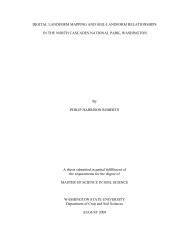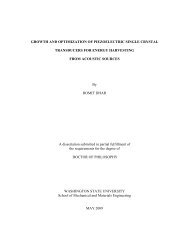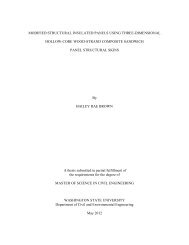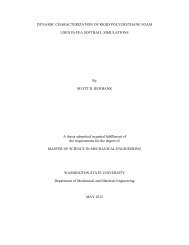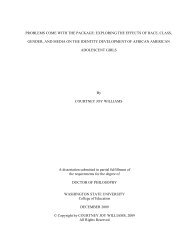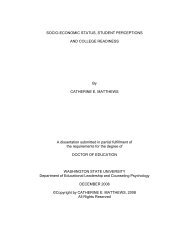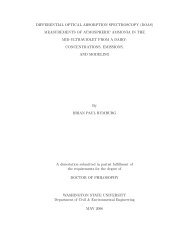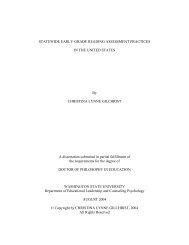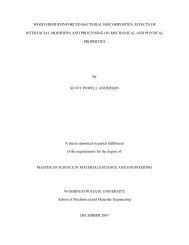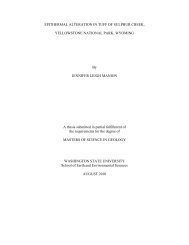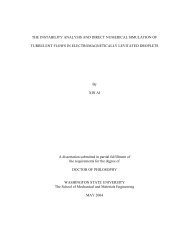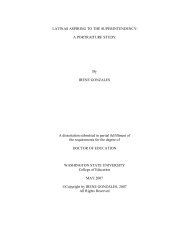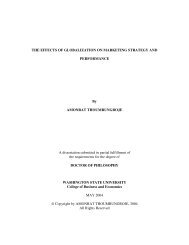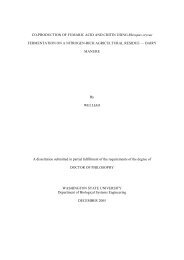the moral reasoning of student athletes and athletic training students
the moral reasoning of student athletes and athletic training students
the moral reasoning of student athletes and athletic training students
Create successful ePaper yourself
Turn your PDF publications into a flip-book with our unique Google optimized e-Paper software.
consistent set <strong>of</strong> <strong>moral</strong> principles, were on <strong>the</strong> average fairly low. Moreover, since <strong>athletic</strong><br />
<strong>training</strong> <strong>student</strong>s are immersed into <strong>the</strong> education <strong>of</strong> a medical pr<strong>of</strong>ession <strong>and</strong> considered a<br />
helping pr<strong>of</strong>ession, <strong>and</strong> not as closely tied to <strong>the</strong> competitive experience <strong>of</strong> <strong>student</strong> <strong>athletes</strong>, it<br />
could be expected that <strong>athletic</strong> <strong>training</strong> <strong>student</strong>s should score higher compared to <strong>student</strong><br />
<strong>athletes</strong>. Yet, consistent with previous studies (Williams, 2006) this study found only a slight<br />
difference between <strong>the</strong> groups on one <strong>of</strong> <strong>the</strong> surveys, <strong>and</strong> no difference on <strong>the</strong> o<strong>the</strong>r.<br />
Often times it seems that <strong>the</strong> focus <strong>of</strong> purpose for institutions <strong>of</strong> higher education tends to<br />
lie in <strong>the</strong> production <strong>of</strong> educated, productive citizens (Cohen, 1998). It could be argued that this<br />
focus draws attention away from <strong>the</strong> foundation <strong>of</strong> such a purpose which is character<br />
development. Perhaps an assumption exists that such development will naturally take place over<br />
<strong>the</strong> course <strong>of</strong> any given curriculum. According to <strong>the</strong> results <strong>of</strong> this <strong>and</strong> o<strong>the</strong>r studies that have<br />
examined <strong>the</strong> <strong>moral</strong> <strong>reasoning</strong> <strong>of</strong> collegiate <strong>student</strong>s (Priest, Krause, & Beach, 1999; Williams,<br />
2006; Beller, Stoll, Burwell, & Cole, 1996; Bredemeier & Shields, 1986), this assumption seems<br />
to be inaccurate. Research in <strong>the</strong> area <strong>of</strong> <strong>moral</strong> education suggests that <strong>the</strong> development <strong>of</strong><br />
character requires intentional effort <strong>and</strong> it has been established that a curriculum specifically<br />
designed <strong>and</strong> implemented in <strong>moral</strong> education may be effective in addressing <strong>moral</strong> <strong>reasoning</strong><br />
(Beller & Stoll, 1995; Bredemeier & Shields, 1995; Lickona, 1991; Stoll & Beller, 1995; Stoll,<br />
Beller, Cole, & Burwell, 1995).<br />
While previous researchers have suggested that <strong>the</strong>re is something specific about <strong>the</strong><br />
competitive environment that negatively influences <strong>moral</strong> <strong>reasoning</strong> (Beller & Stoll, 1995;<br />
Beller, Stoll, Burwell, & Cole, 1996), low levels <strong>of</strong> <strong>moral</strong> <strong>reasoning</strong> may be a society wide issue<br />
<strong>and</strong> affecting change may seem to be a daunting task. However, <strong>the</strong> institution <strong>of</strong> higher<br />
education as whole may be positioned to begin affecting at least on <strong>the</strong> level <strong>of</strong> its <strong>student</strong>s. The<br />
81



